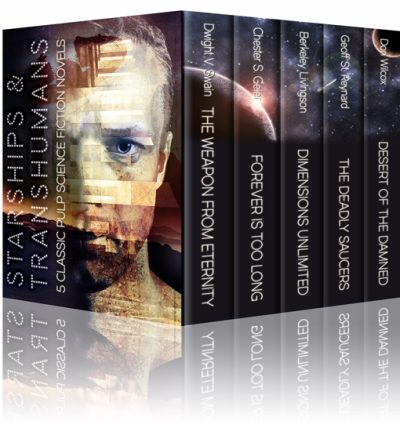Ships that take us on journeys to other solar systems and people who develop powers and abilities beyond the usual have been inseparable in science fiction since its dawn as a literary genre. The most mind-bending of early space operas, the Lensmen series by the Homer of the spaceways, Edward E. Smith Ph.D., combined ships that galloped up parsecs by the second with extraordinary scenes of transcendence. In this megabundle you will find five early pulp science fiction novels that focus on starship travel or transcending the state of humanity—and in a few cases, both. Here you'll find work by:
Dwight V. Swain (1915 – 1992), one of the most popular of the "new" post-war crop of science fiction writers in the pulps during the early fifties. Fans of the Star Wars movie series will thrill to The Weapon from Eternity, his offering here, which can best be described as a ring-a-ding space opera with style.
Chester S. Geier (1921-1990) was one of the Chicago writers who began writing science fiction for Ray Palmer when he became editor Amazing Stories and Fantastic Adventures for the Ziff-Davis (located in the Windy City) chain of pulp magazines. At the time of the first publication of Forever is Too Long, then fan Robert Silverberg, now a multi-winning Hugo and Nebula author, hailed it as “a wonderful story” and said, “almost any other immortality story would be inferior.”
Berkeley Livingston (1909-1975) was another of Palmer’s circle of writers who contributed much to the shaping of Amazing and Fantastic during their 1940s heyday. According to Richard Simms, who made a close study of Livingston’s work, he was “a talented and versatile writer” whose work was “action-packed,” “fast-moving,” “colorful” and “thought-provoking.” Dimensions Unlimited displays all those literary virtues, as well as taking place, in part, in the universe of the famed and controversial Shaver Mystery.
Geoff St. Reynard was a pseudonym of historical novelist Robert W. Krepps (1919-1980) famed outside the science fiction world for such bestsellers as The Court of the Lion, Baboon Rock and Tell It on the Drums. As a science fiction novelist, he is best known as the author a number of fine alien invasion tales written in the midst of the Cold War wave of flying saucer sightings. The Deadly Saucers (also published as Don’t Panic) is one of the best of these.
Don Wilcox (1905-2000), according to Fancyclopedia 3, was one of Amazing Stories’ “most prolific and popular contributors.” The young Terry Carr, who would become one of the field’s ablest critics and editors, once wrote to Amazing begging, “Give us more Wilcox, please!” We think that after reading the extraordinarily imaginative Desert of the Damned, written during the World War II era, you, too, will be begging, “Give us more Wilcox, please!”





